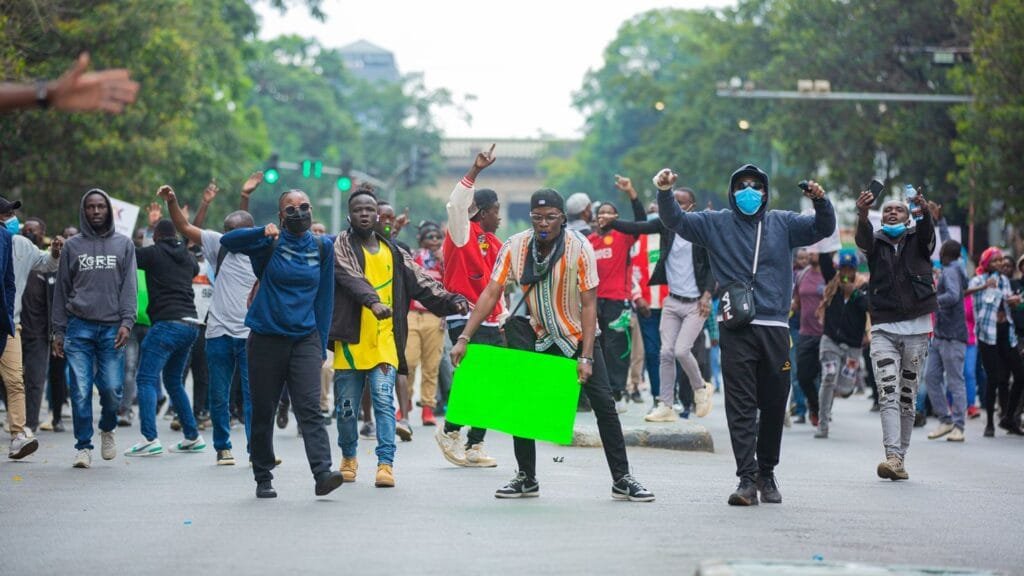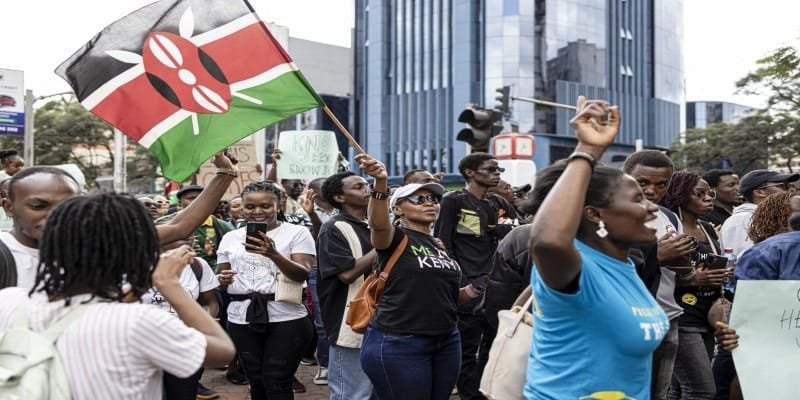The recent tax protests in Kenya are a significant response to the proposed Finance Bill 2024, which has introduced a number of controversial tax measures. President William Ruto’s administration aims to address the country’s fiscal deficit and economic challenges through these tax proposals, which are intended to raise additional revenue. However, these measures have sparked widespread discontent among the public, leading to a series of demonstrations across the country.
Here is everything you need to know about the tax protest in Kenya;
Background of the Finance Bill 2024
The Finance Bill 2024 aims to address Kenya’s budget deficit through new taxes and levies. Key proposals include:
- 16% VAT on Petroleum Products: Aimed at increasing revenue but likely to raise transportation and production costs, impacting the cost of goods and services.
- Housing Levy: A proposed 1.5% deduction from employees’ salaries to fund affordable housing projects.
- Motor Vehicle Taxes: Annual taxes on motor vehicle insurance, are intended to boost revenue from the automotive sector.
- Environmental Tax: Aimed at goods that degrade the environment, promoting sustainable practices but increasing costs for manufacturers and consumers.
Public Response and Major Protests
The proposed tax hikes have sparked widespread protests across Kenya. Here’s a closer look at the major demonstrations:
Nairobi:
- Protests began in the capital with demonstrators opposing the increased cost of living due to new taxes.
- Police used tear gas and water cannons to disperse crowds, resulting in over 200 arrests, including observers from Amnesty International.
Eldoret:
- Significant demonstrations in President Ruto’s hometown saw thousands of young people take to the streets, disrupting business activities. The scale of the protest here mirrored the large gatherings seen during Ruto’s election victory.
Mombasa:
- Protesters marched along Moi Avenue, opposing the Finance Bill. The demonstrations disrupted local businesses and traffic but were largely peaceful.
Kisumu:
- Protests in Kisumu turned violent as police clashed with demonstrators. Tear gas was used to disperse crowds, and businesses temporarily closed as a precaution.
Other Regions:
- Protests also occurred in Kilifi, Nakuru, Nyeri, and Voi. While some demonstrations were peaceful, others saw clashes between protesters and police, highlighting the nationwide discontent with the bill.

Key Events and Dates
- June 6, 2024 – “Sita Sita” Protests: The protests, dubbed “sita sita” (six six), were held on the sixth day of the sixth month. Hundreds of demonstrators marched towards Parliament, chanting slogans against the Finance Bill. Police fired tear gas and arrested 11 protesters in an attempt to disperse the crowds.
- June 20, 2024 – Major Protests in Nairobi: On this day, large-scale protests erupted in Nairobi. The protests began at 11:30 am along Kenyatta Avenue, with police using tear gas to disperse the large crowd. Demonstrators retaliated by throwing tear gas canisters back at the police. Similar protests occurred in other major cities and towns, including Nakuru, Eldoret, Kisumu, and Nyeri.
- June 24, 2024 – Protests Spread Nationwide: Protests spread to various regions including the president’s hometown of Eldoret. In Nyeri, protesters chanted “Ruto must go” and in Kisii, the chants included “We are tired,” reflecting the widespread discontent with the government’s policies.
Government Response
In response to the protests, the government made several concessions:
- Tax on Bread: Initially proposed, this tax was dropped following a public backlash.
- Motor Vehicle Insurance Tax: Amended to address public concerns.
- Environmental Tax: Adjusted to apply only to imported goods, encouraging local manufacturing.
Despite these amendments, the core aspects of the Finance Bill remain, and President Ruto has defended the tax increases as necessary for reducing reliance on borrowing and stabilizing the economy. He argues that these measures will ultimately benefit the country by funding essential public services and infrastructure projects.
Public Sentiment and Broader Implications
The protests are driven by a broader dissatisfaction with economic conditions in Kenya:
- High Inflation: Many Kenyans are struggling with rising prices for basic goods and services.
- Unemployment: High joblessness, particularly among the youth, exacerbates economic hardships.
- Government Trust: There is a significant trust deficit between the public and the government, with many viewing the tax hikes as punitive and poorly timed.
The protests have brought to light the urgent need for the government to address these economic issues comprehensively. The coming weeks are crucial, as lawmakers are expected to vote on the Finance Bill soon. The outcome will significantly influence the direction of future protests and the government’s ability to maintain public order and trust.
Conclusion
The tax protests in Kenya are a clear indication of the public’s frustration with the government’s handling of economic issues. As the Finance Bill 2024 progresses through parliament, the government faces the challenge of balancing fiscal responsibility with the need to address the public’s economic grievances. The situation underscores the importance of inclusive and transparent policymaking in fostering public trust and social stability.














